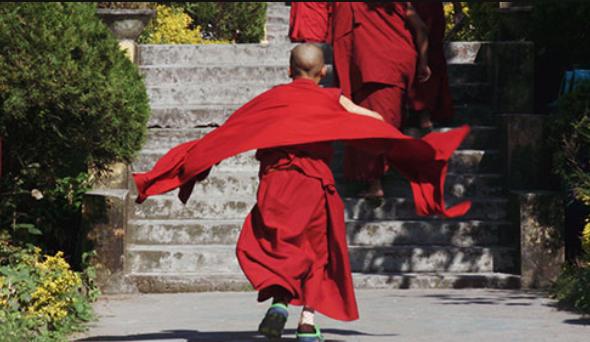Gyütö
Documentary by Filipa Cardoso
Production :
Sound Image Culture
Koan productions (Paul-Jean Vranken)
Wajnbrosse productions (Marc Henri Wajnberg)
Hearing the sound of the ocean in the Himalayas... This unlikely wish takes a film director and her three curious girls to Gyuto, a Tibetan Buddhist monastery echoing day and night the sacred tantric chants of meditation, which the monks say, ‘sound like the waves of the ocean’.
Gyütö is a web documentary. We navigate in the non linear film structure through a mandala.
Front-end Development: Baptiste Firket, Pedro Seromenho & Geoffrey Poelmans
Back-end Development: Liliane Mamane
Mandala Development: Geoffrey Poelmans
UX/UI Design: Pedro Seromenho
Projet created at Becode coding school.
This project started in 2012 when Filipa’s partner, fascinated by the ritual chanting of the monks of Gyütö, proposed to them to do a collaboration with his contemporary jazz group Octurn. During the meeting, the monks proposed to make a mandala. They brought in their suitcases the necessary sand and pigments, but still needed compasses, rulers and squares in order to draw the outlines. Thus, Gaia, Nemo and Yuna shared their school utensils with them and followed closely the drawing of the mandala… 5 days during which they bonded almost like a family. At the end of each day, the girls would take the monks around the city and revel in the way they wondered at the sight of a big car or took pictures of themselves in front of the oddest of buildings. A group of Chinese tourists asked them to pose for them together with the monks as if in a family photo where the monks became for a moment their big brothers. These were light moments, but behind the monks’ seeming lightheartedness hides a spirituality of unfathomable depth. What triggered this project was the unstoppable urge to feel this vibratory intensity at its source.
“By sharing our state of extreme awareness with a public who is unfamiliar with tantric practices, we exorcise the present negative forces, and the mere fact of interacting with us generates a beneficial effect”
Perched high in the Indian Himalayas, the Tibetan Monastery of Gyütö is a university recognized by tantric Buddhism where 400 monks live. Tibetan Buddhist monasteries have been forbidden in China; some of them have been reestablished elsewhere, such as Gyütö, in India. The monastery is near Dharamsala, nerve center of the Tibetan Government in exile and of the Dalai Lama’s monastery. Gyütö lives to the rhythm of the Tibetan calendar and of its rich rites of a 500 year-old history.
In Gyütö, the deep chanting from the rituals goes on late into the night and echoes in the corridors of the buildings adjoining the temple, lulling the monk's sleep. Before dawn, the sutras (Buddha's teachings) echo already in these same corridors, greeting the souls returning from the land of dreams. We are immersed in this sonorous reality of the monastery, which runs through all the movies.
SoundImageCulture - SIC is a workspace where artists, filmmakers, anthropologists can find support to realise their personal projects. SIC offers an 18-month program in Brussels that involves artistic coaching through collective seminars, individual mentoring, group critiques, and inter-artist dialogue. SIC believes in the richness that arises from breaking the boundaries between genres: art/cinema, fiction/documentary, poetry/essay. SIC promotes the idea of thinking by doing, rather than writing in order to do. Discussions start on audio-visual materials and focus on formal and ethical questions during the creative process, with the purpose to develop an original and personal point of view. SIC is not oblivious to an ethical reflection on representation in contemporary media: we believe this to be an urgency of the multicultural society we live in.
SoundImageCulture - SIC is supported by the FWB - Fédération Wallonie-Bruxelles , VAF - Vlaams Audiovisueel Fonds and VGC - Vlaamse Gemeenschapscommissie.






